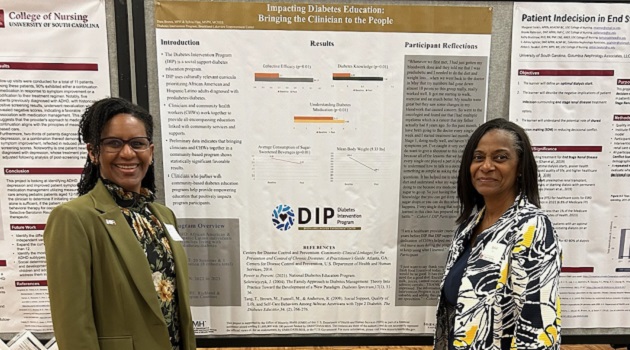Dara Brown and Sylvia Flint, senior community health coordinator and project coordinator respectively at the Brookland-Lakeview Empowerment Center’s (BLEC) Diabetes Intervention Program (DIP) for Families, recently shared their research findings at the University of South Carolina College of Nursing Research and Scholarship Day. Their study titled “Impacting Diabetes Education: Bringing the Clinician to the People” showcased the program’s success in reaching and educating African American and Hispanic populations diagnosed with prediabetes or Type 2 diabetes.
DIP, a prominent initiative of BLEC aimed at tackling a concerning health issue, is a social support diabetes education program specifically designed for African American and Hispanic/Latino adults diagnosed with prediabetes/diabetes in metropolitan Columbia. The program utilizes culturally relevant curricula to prioritize the needs of these communities.
“We want to express our gratitude to the University of South Carolina College of Nursing for providing us with the platform to present the findings of this important research conducted by two dedicated and accomplished members of our staff,” said Dr. Cindye Richburg Cotton, executive director of BLEC. “The implications of their research cannot be overstated.”
The research objectives centered on recognizing the disparity rates of prediabetes and diabetes in South Carolina, defining the community health worker and guest lecturer model, and describing the potential impacts of community-clinical collaborations. Their findings align with the Institute of Medicine’s stance, emphasizing the importance of enhanced collaboration between healthcare and community non-healthcare sectors for better prevention and treatment outcomes in chronic diseases.
“Our research clearly demonstrates the value of encouraging clinicians to collaborate with community-based organizations to provide comprehensive education and support to individuals with prediabetes/diabetes,” Brown emphasized.
The research data revealed significant positive outcomes from bringing clinicians and Community Health Workers (CHWs) together in a community-based program, including improved collective efficacy and knowledge, reduced consumption of sugar-sweetened beverages, and decreased body weight among participants. Flint highlighted the role of clinicians in empowering program participants through education.
CHWs and clinical guest speakers facilitated twenty sessions, with CHWs providing regular support to participants outside of classes, monitoring goal progress, addressing social determinant needs, and offering overall support. Statistical analysis using a t-test indicated significant improvements from baseline to post-assessment.
For further information about this research or the DIP for Families program, individuals can contact Mrs. Sylvia Flint, project coordinator, at 803-744-1971 or via email at sflint@brookland.cc.



